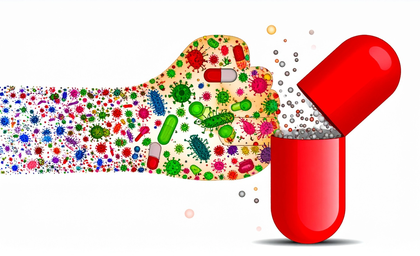Ibuprofen, acetaminophen may be silently driving antibiotic resistance: Study
By IANS | Updated: August 27, 2025 12:30 IST2025-08-27T12:29:19+5:302025-08-27T12:30:14+5:30
New Delhi, Aug 27 Common painkillers like ibuprofen and acetaminophen are quietly fueling antibiotic resistance -- one of ...

Ibuprofen, acetaminophen may be silently driving antibiotic resistance: Study
New Delhi, Aug 27 Common painkillers like ibuprofen and acetaminophen are quietly fueling antibiotic resistance -- one of the world's biggest health threats, according to a study.
Researchers from the University of South Australia found that ibuprofen and acetaminophen are not only driving antibiotic resistance when used individually but also amplifying it when used together.
The team assessed the interaction of non-antibiotic medications, the broad-spectrum antibiotic ciprofloxacin, and Escherichia coli (E. coli) -- a common bacterium that causes gut and urinary tract infections.
The findings, published in the journal npj Antimicrobials and Resistance, showed that ibuprofen and acetaminophen significantly increased bacterial mutations, making E. coli highly resistant to the antibiotic.
The study shows how antibiotic resistance is a more complex challenge than previously understood, with common non-antibiotic medications also playing a role.
"Antibiotic resistance isn't just about antibiotics anymore," said lead researcher Rietie Venter, Associate Professor at the varsity.
"This is especially prevalent in residential aged care facilities, where older people are more likely to be prescribed multiple medications -- not just antibiotics, but also drugs for pain, sleep, or blood pressure -- making it an ideal breeding ground for gut bacteria to become resistant to antibiotics," Venter added.
The team looked at the effect of non-antibiotic medicines and ciprofloxacin -- an antibiotic that is used to treat common skin, gut, or urinary tract infections.
"When bacteria were exposed to ciprofloxacin alongside ibuprofen and acetaminophen, they developed more genetic mutations than with the antibiotic alone, helping them grow faster and become highly resistant.
Worryingly, the bacteria were not only resistant to the antibiotic ciprofloxacin, but increased resistance was also observed to multiple other antibiotics from different classes," Venter said.
This study is a clear reminder that we need to carefully consider the risks of using multiple medications -- particularly in aged care, where residents are often prescribed a mix of long-term treatments.
While this doesn't mean "we should stop using these medications, but we do need to be more mindful about how they interact with antibiotics -- and that includes looking beyond just two-drug combinations," Venter said.
Disclaimer: This post has been auto-published from an agency feed without any modifications to the text and has not been reviewed by an editor
Open in app